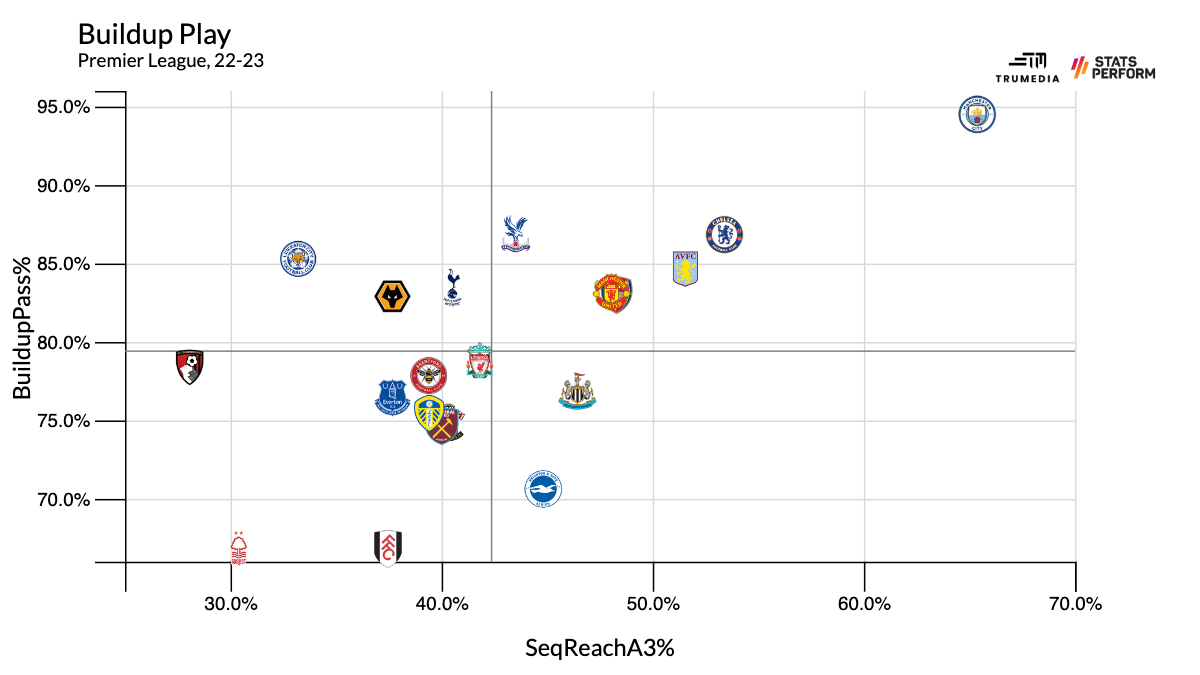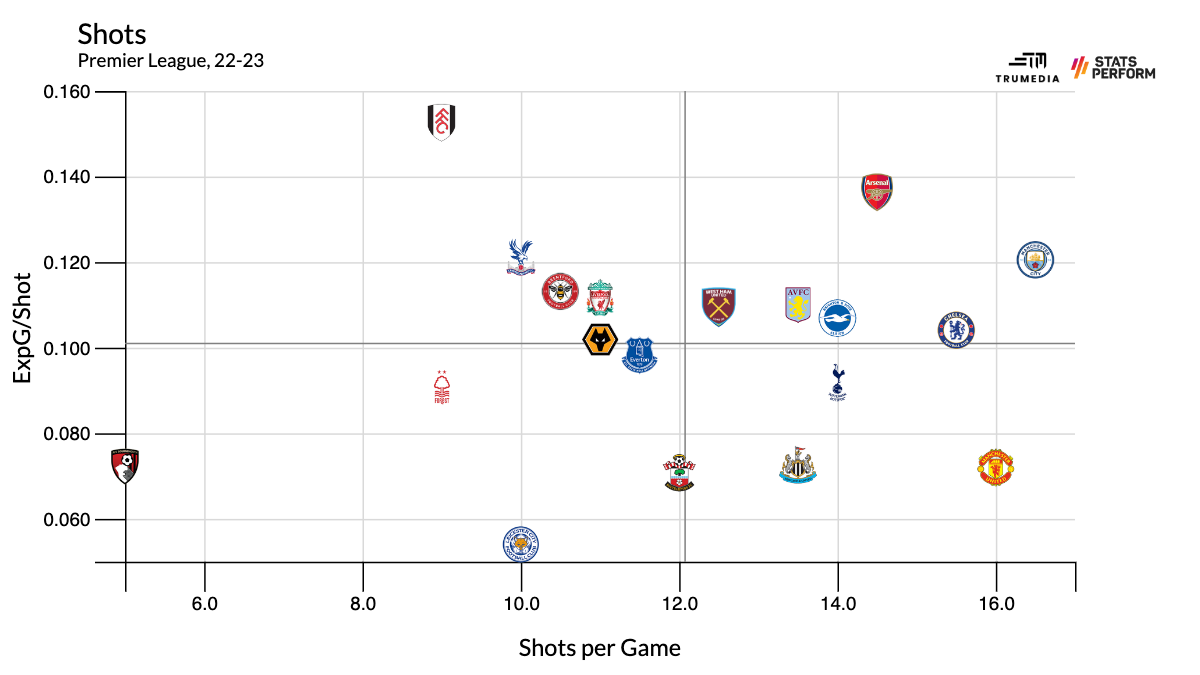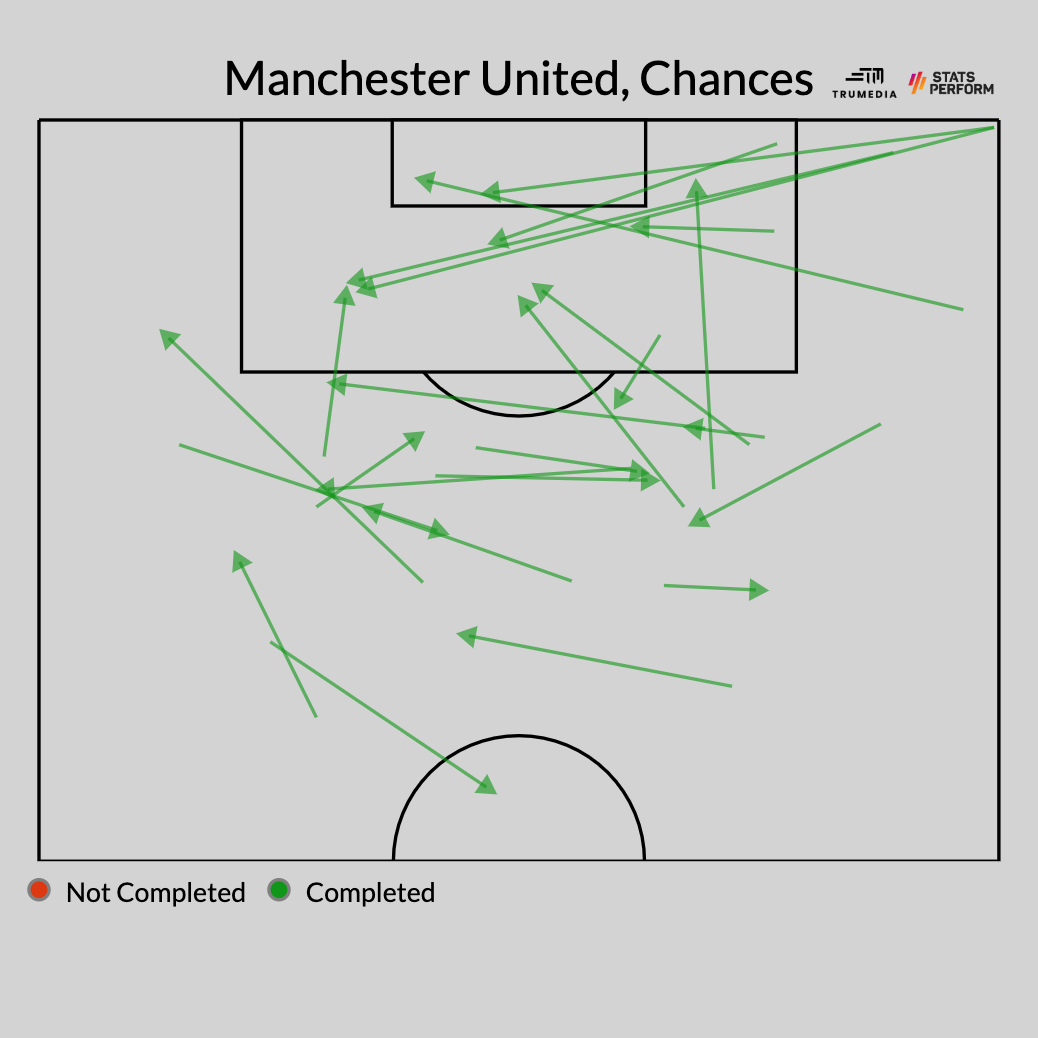It was early December 2013. Manchester United had just lost 1-0 to Newcastle United. It meant the reigning champs had lost back-to-back home matches for the first time since 2002, and it was Newcastle's first win at Old Trafford since before the end of the Vietnam War. In his first season replacing Sir Alex Ferguson, David Moyes had managed the team to just 22 points from 15 matches. Nearly midway through the season, they were in ninth -- four points closer to the relegation zone than to first place.
Just about everything was going wrong, as confirmed by the manager and the club in one of the all-time-great team-account tweets of the early Twitter era. No memes, no weird half-ironies only understood by those of us who spend all day refreshing our accounts, no context necessary. Just this plain-spoken bit of perfection: "David Moyes says #mufc must improve in a number of areas, including passing, creating chances and defending."
Now, I wrote about how Manchester United hadn't advanced beyond the Moyes era ... three years ago. And yet, that tweet from 2013 might be even more relevant today than when it was first published. Two games into the current campaign, United sit last in the league table, with two losses from two games and a minus-5 goal differential.
If new manager Erik ten Hag is going to turn this thing around, his team must improve in a number of key areas, including passing, creating chances and defending. But how?
Passing
At Ajax, Ten Hag's teams aggressively built out from the back, drawing opponents to them and then breaking the pressure with slick passing combinations or, say, Frenkie De Jong dribbling past the entire team all by himself.
Much to the chagrin of Ten Hag (and Barcelona), United do not have Frenkie De Jong. And the closest archetype to De Jong that United have had, Paul Pogba, is now playing for Juventus. So over the first two matches, United have tried to pass the ball out from the back -- and they've failed, miserably. Against Brentford, they turned the ball over within 40 meters of their own goal six times: three of them led to turnovers, and two of them led to goals.
Yesterday saw the first time that Manchester United conceded multiple goals following a high turnover in a Premier League game since Sir Alex Ferguson retired. #MUFC pic.twitter.com/45ZzeYZ71w
— The Analyst (@OptaAnalyst) August 14, 2022
Through two matches, they've turned the ball over 15 times within 40 yards of their own goal, with eight of those turnovers directly leading to shots. Last season, they allowed 1.6 of those shot-generating high turnovers per match.
"Passing," of course, is a vague term, and a number of factors go into whether a pass is completed. No two passes are created equal or occur in a vacuum. The player on the ball needs to be able to recognize the pass and then execute it with the right degree of technical precision. But the receiver also has to find space and be able to receive the ball, with those same responsibilities flipping around for his next action, and so on and so on. Passing is a collective act, a chain of decisions and reactions that create more decisions and more reactions.
- ESPN+ viewers guide: LaLiga, Bundesliga, MLS, FA Cup, more
- Season predictions for Europe's top five leagues
One big issue for United, if they continue to try to play this way, is that there's no one at the base of the possession chain.
In goal, David De Gea has never been comfortable with the ball at his feet and over his past five-plus seasons with United, he has completed less than 70% of his passes. Compare that to the teams that United wants to be competing with: Liverpool's Alisson has connected on 84.9% of his passes in the Premier League, while Manchester City's Ederson has completed 86.6% of his. When a possession reaches De Gea's feet, it's simply way more likely to end in a turnover than when the same thing happens at Liverpool and City.
This weakness, however, is compounded by the fact that United still haven't signed the defensive midfielder everyone has been telling them to sign for the better part of a decade now. While it's natural to view this theoretical player's main import as his ability to protect the backline without the ball, United also need a player who can keep these longer possessions alive in the early stages. For most top teams, the deepest midfielder isn't necessarily the one who makes dangerous, Andrea Pirlo-esque, line-breaking passes; no, he's the one who makes the simple sideways pass out of pressure to keep the possession going.
Fred and Scott McTominay have never been reliable passers, so Ten Hag tried out his Matchday One center forward, Christian Eriksen, at defensive midfield against Brentford. It didn't go well:
Eriksen is a fantastic creative passer; he pushes the ball into the penalty area as well as anyone other than Lionel Messi. But he has never completed his passes at a particularly high clip: just 77.1% over the past five-plus seasons. To make the same comparison as above: Fabinho has completed 88.3% of his passes since joining Liverpool, while Rodri is up at 92.2% since signing with Manchester City.
For now, at least, Eriksen just doesn't really seem to understand the spaces he needs to occupy in this role, or how a turnover in your own third is way more costly than it is at the other end.
Chance Creation
When they're not turning the ball over in their own third, United really haven't been that bad at moving the ball into the attacking third. This chart compares a team's pass-completion percentage outside the attacking third with the percentage of their uninterrupted possessions that reach the attacking third. (Note: none of the data in this piece includes anything from Monday's Liverpool-Crystal Palace match.)

United are close to exactly equal with Arsenal, and they're really only behind Aston Villa, Chelsea and Manchester City when compared across both metrics. Since they've been able to move the ball into the attacking third at a relatively high clip over their first two matches, United have also been able to attempt a ton of shots: 32, just one fewer than City's league-most 33. The problem, instead, is that they've mainly been terrible shots. Their average shot distance is 17.3 yards, the fourth-highest number in the league, and their expected-goals-per-shot average is also among the worst so far:

Despite attempting the second-most shots in the competition, they've scored just one goal. They've been unlucky not to score more, but the 2.3 xG they've created is still just the 11th-best mark through two matches. Because they've gone down early in both of their matches, United have spent most of their opening games against teams that were no longer trying to optimize the number of goals scored, and were instead focused on organizing bodies behind the ball.
Given their issues executing the patterns in buildup play, it's perhaps unsurprising Ten Hag's team also hasn't been able to execute the precision movements required to break down a packed-in defensive in the attacking third. Most of their passes that created shots were just from sideways ball circulation rather than probing, high-value balls into the box:

Interestingly, United have been most effective under Ten Hag in the same way they were, at times, effective under Ole Gunnar Solskjaer: when they move the ball quickly.
Stats Perform defines a direct attack as an "open play sequence that starts just inside the team's own half and has at least 50% of movement towards the opposition's goal and ends in a shot or a touch in the opposition box." Through two matches, United have generated five direct attacks -- tied with Fulham for most in the league.
Defending
Yeah, it has been pretty bad. Through two games, here's where United rank across a number of key metrics:
Goals allowed: 6, T-18th
xG allowed: 3.11, 15th
Shots allowed: 28, 15th
Set-piece shots allowed: 11, T-18th
Touches in penalty area allowed: 51, T-15th
And that's all despite United averaging 65% of the possession in their matches -- the third-highest clip in the league. Basically, United's most effective form of defense so far has been making sure they're not playing defense. Once they lose the ball, they do try to win it back high up the field, but they've created only 15 turnovers within 40 yards of the opposition goal, which ranks 11th in the league. And their average defensive action takes place 38.92 meters from their own goal, the fifth-deepest mark in England.
Translation: they've been a below-average defense, if not worse, in just about every possible way so far.
So, uh ... what happens next?
You can see how this is sort of a toxic cycle. With their current personnel, United still seem best suited for a faster, transition-based approach with the ball. But in order to be effective in that style, you need players who are comfortable in stretches without the ball in order to create the space to eventually push the transition attacks into.
Ten Hag doesn't have many of those players -- and doesn't seem to want any of them -- so instead he has prioritized keeping the ball. Except, United don't really have the players to effectively play that way yet, either, so it leads both to slower possessions that allow the opposition to get bodies behind the ball and to costly turnovers in the defensive third.
In an effort to both try to create some more of those transitional moments and to keep the ball away from their defensive third altogether, the team tries to press high. But so long as Cristiano Ronaldo is still playing matches for Manchester United, they won't have an effective press, which means the press gets broken and those defensive weak links are suddenly going to be defending against the most difficult situations in modern soccer: high-speed counterattacks in tons of space.
More from Ryan O'Hanlon:
- Why are Barcelona selling off their future?
Is the Bundesliga too weird for Bayern Munich?
- The evolution of Raheem Sterling: How City, England star revamped his game
Ten Hag doesn't deserve much blame for this -- at least not yet. He's trying to get Manchester United to play the style of soccer -- fluid possession, paired with a high-powered press that pins the ball in the attacking third -- that title-winning teams tend to play in the year 2022. The problem is that United haven't built a roster meant to play that way because they haven't built a roster meant to play any particular way. Instead, they've assembled an expensive collection of big-name players without any thought as to how they might fit together, how they might amplify one another's strengths and protect against one another's weaknesses.
If anything, they've created a roster filled with players who seem to make each other worse.
Rather than truly aiming to rebuild the club with any kind of long-term plan that will enable them to eventually compete with the elite managers and recruitment teams in place at both Manchester City and Liverpool, for example, they've spent the entire summer chasing after players who have some kind of connection with their current coach. For a club that can afford just about anyone in the world, it would have to be a once-in-a-century coincidence that all of the best players they could find just so happened to be players who cut their teeth in the Eredivisie.
I don't blame Ten Hag for that; most coaches are terrible talent scouts, and any healthy club would have a process in place to prevent that from happening. The way you build a great team is by identifying the right players for the right coach, who can then make those players better -- not just by buying some of the players the coach tells you he wants.
Rather than maximizing results with a short-term tactical approach, Ten Hag is trying to totally revamp United's approach in a way he thinks will lead to long-term success. We won't know whether his way is actually the right way for a while, and if he continues on with a variant of the same approach, there's bound to be plenty more frustration throughout the rest of this season. If this is going to have any chance of working out eventually, United will need to be patient and they'll also need to identify the kind of players who stand a chance of being a part of whatever the next great United team, led by their current coach, might look like.
Here's the thing, though: why should anyone expect that to happen? We've been waiting 10 years, and it has only gotten worse.
